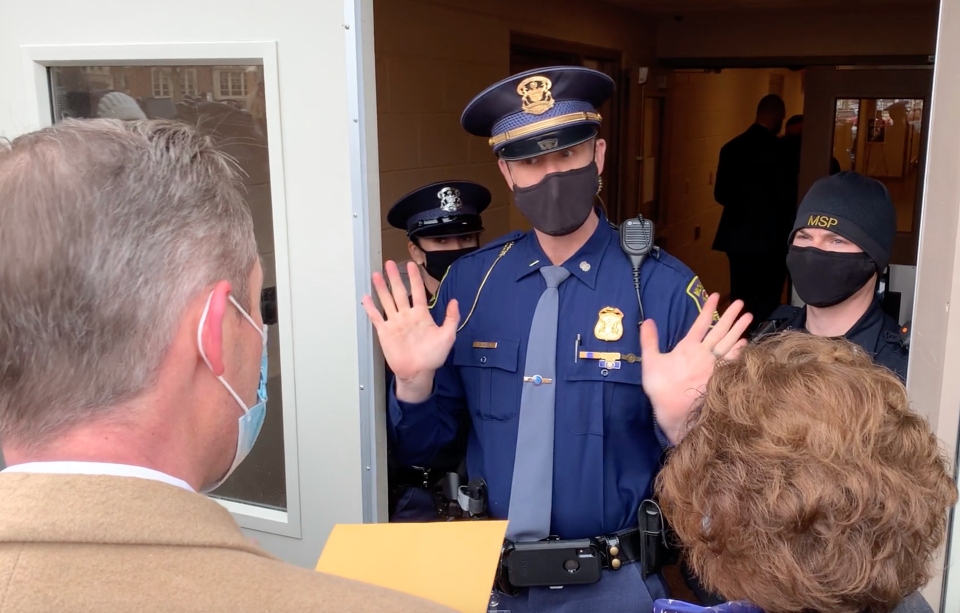In Michigan fake electors case, cooperation agreement could spur more 'flips,' experts say
- Oops!Something went wrong.Please try again later.
The legal case of a group of faux electors charged for attempting to falsely transmit Michigan’s 2020 electoral votes for former President Donald Trump received a twist last week, as one defendant had his felony charges dropped after agreeing to cooperate with Attorney General Dana Nessel’s Office as they attempt to prosecute the group.
And now that James Renner, one of the individuals charged, has agreed to cooperate with prosecutors against his former co-defendants, former prosecuting attorneys say it could set the stage for additional cooperation pleas, as Nessel’s office could gain key insight from the evidence Renner discloses.
Getting a defendant to cooperate traditionally is a big win for prosecutors, experts say
“In almost every conspiracy case, it always strengthens the prosecution's case to have someone who is part of the conspiracy, who can give firsthand information regarding the knowledge of the co-conspirators, the conversations that took place that exhibit the intent of those other conspirators to break the law,” said Jeffrey Swartz, professor of criminal procedure and criminal law at Cooley Law School. Swartz has nearly five decades of experience in the criminal justice system, including as a prosecutor, judge and criminal defense attorney.
“It also can present the idea that everyone in that room knew what they were doing was illegal.”
Renner had his case dismissed Thursday after Assistant Attorney General LaDonna Logan informed the Ingham County judge presiding over the case of an “agreement between the parties.” Clint Westbrook, Renner’s lawyer, said, “we’re excited for this result.”
Initially, Renner, like the 15 other co-defendants, had pleaded not guilty to a series of felony charges. A spokesperson for the attorney general’s office confirmed the charges against Renner were dropped under a cooperation agreement.
Now, with Renner cooperating, prosecutors will have the ability to gain firsthand knowledge of any potential conspiracy through interviews, said Barbara McQuade, former U.S. Attorney for the Eastern District of Michigan.
“It's a very significant development,” said McQuade, who now teaches law at the University of Michigan. “It's a classic prosecutor's tactic to try to flip the lowest-level defendant and try to work your way up the chain. If the lower-level defendant can tell you, 'yes, indeed, there was a conspiracy, and here are some of the things that happened and what I saw and what I heard and what I agreed to,' that can be very helpful evidence.”

One defendant’s cooperation can often lead to more “flips”
Both McQuade and Swartz noted that for other co-defendants, seeing someone else on the indictment agree to cooperate with prosectors can be worrisome, especially given that most cooperation agreements involve being willing to testify against former co-defendants.
“When someone from the inside, someone with the knowledge of all big events, and what was said and what was done, agrees to testify — it rattles the cages of everybody else,” Swartz said.
McQuade referenced the likelihood of Renner giving a proffer interview to prosecutors. A proffer involves a defendant willingly disclosing information to prosecutors. Sometimes, defendants will have to sit down for multiple proffers to carry out cooperation agreements.
“Here, to completely drop the charges is a pretty good deal,” she said. “What that says to me is the prosecution believes they’ve got something very valuable in exchange, and they know what that is if that person has come in and proffered what they can provide.”
“The other value, in addition to the substance of the testimony, is it does start to cause others to flip, if you hear that this defendant has entered a guilty plea.”
In larger cases, cooperation agreements can reach a point of “diminishing returns”
Swartz noted that two individuals charged in the fake electors scheme, Kathy Berden and Meshawn Maddock, both held official party titles when the scheme was attempted in 2020 — Berden remains a Michigan National Committee member for the Republican National Committee, while Maddock at the time was co-chair of the Michigan Republican Party. This could lessen the likeliness that either of them are offered any sort of agreement in return for cooperation.
“I'm sure there will be more defendants who will be offered no-jail pleas. I think they just want these two, (since they) are definitely the head of the snake,” Swartz said.
McQuade echoed this, noting, “prosecutors typically view people in positions of trust and authority as having a greater responsibility to the public.
“I would think that it's (likelier) to make deals with the people they perceive to be lower-level offenders, to work their way up to those people who have either current or prior roles,” McQuade said.
Still, in a case involving more than a dozen defendants, McQuade said if more defendants agree to cooperate, the prosecution loses the incentive to offer plea deals — if prosecutors can gather enough potential evidence, there would be less reason to continue to offer dropped charges or lesser penalties.
“There's no magic number,” McQuade said, of cooperating defendants. “Every case is different. Prosecutors typically want more evidence, more evidence is always better, but at some point, it is diminishing returns.”
Swartz expects Renner won’t be the last defendant to seek a cooperation agreement.
“When one falls, the dominoes start to fall. And everybody starts to sense this is not a good idea,” Swartz said. “Anticipate in the near future that there are a substantial number of these defendants who are offered misdemeanors and no-jail offers and will take them in return for testifying. And if I'm at the top of the indictment, I'm not a happy camper.”
Contact Arpan Lobo: alobo@freepress.com. Follow him on X (Twitter) @arpanlobo.
This article originally appeared on Detroit Free Press: Agreement deal in fake elector case could mean more flips, experts say

